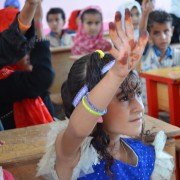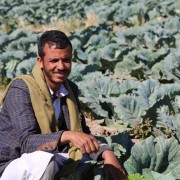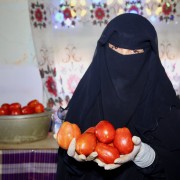Speeches Shim

As a result of the ongoing civil war, Yemen is suffering the largest humanitarian crisis in the world. USAID is working with international and local partners to rebuild key social and economic institutions, help address the underlying causes of instability, and build the foundation for durable peace and prosperity to foster Yemen’s future resilience.

Like millions of other rural farmers, Warda’s crops and income were destabilized by the war in Yemen. “Our suffering doubled when the war began; we could no longer care for our farm due to the absence of diesel, water scarcity, and the country’s economic conditions in general,” Warda explained.

Ahmed has been a farmer all of his life, like his father and grandfather before him. He grows garlic, cabbage, tomatoes, and beans on his 18 acre plot in Dhamar, Yemen. However, due to the conflict, farmers like Ahmed contend with fuel shortages and extreme price hikes for inputs. As a result, many farmers across the country are now left with barren fields. Even though Ahmed has continued to farm through this crisis, he has found it increasingly difficult to buy fuel to pump water from his well—forcing him to farm smaller areas and produce lower quality crops.

The Arab Spring has yet to deliver the jobs and improved livelihoods so many had hoped for. Nowhere is the situation more acute than in Yemen, where five years of violent conflict have pushed the population to the brink of famine, sparking the world’s most dire economic and humanitarian crisis. If and when a peace agreement is reached, experts project that Yemen will be home to upwards of one million former combatants who will need to be reintegrated into society. In addition to providing critical humanitarian aid to the Yemeni people, USAID is leading strategic initiatives that guide at-risk populations toward productive activities that can contribute to the country’s stability and reconstruction.

Roaida Ahmed lives with her husband and their three children in the Yemeni village of Al-Qara’a. For years, they made their living through farming, with tomatoes being a major crop. However, due to the ongoing war, farming no longer offers a viable source of income. Water is scarce, fuel prices are high, and the roads to the markets are no longer safe. As a result, Roaida’s family, like so many in Yemen, lives on the brink of famine.


Comment
Make a general inquiry or suggest an improvement.